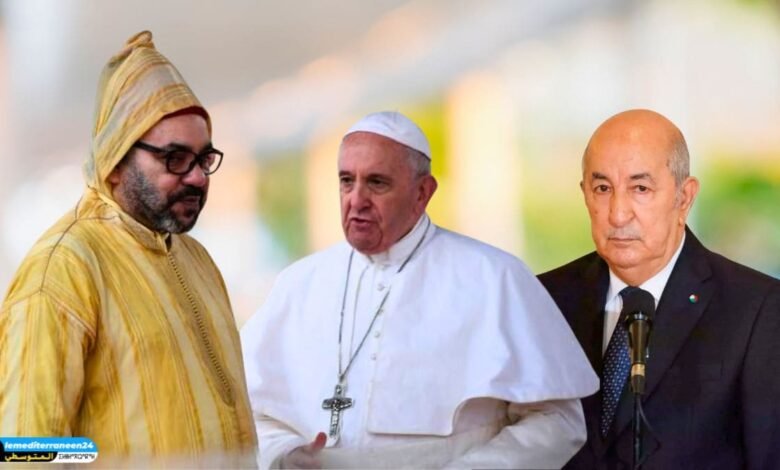The Death of Pope Francis, the Division of Christianity, Condolences in Morocco and Relief in Algeria

The death of Pope Francis is plunging the Christian world in general—and the Catholic world in particular—into deep division. The Argentine Pope initiated a series of reforms and proposed others that shook the foundations of the ecclesiastical establishment.
He managed to implement some changes, such as expanding the religious role of women—though to a lesser extent than in other branches of Christianity where women have reached the position of bishops; reducing the penalties for moral transgressions by the faithful, particularly regarding “sins and sexual deviations”; integrating marginalized communities such as prisoners and the poor; opening unconditional dialogue with other religions including Islam, Buddhism, and Judaism; and bringing together other Christian churches like Protestantism, Lutheranism, Calvinism, and various branches of Orthodoxy.
However, his sermons and messages calling for humility, social justice, and strict human rights did not succeed in breaking the grip of Vatican bureaucracy nor the resistance of a Roman curia entrenched for centuries in its prideful, discriminatory caste system.
The Catholic world, with over 1.2 billion followers, resembles more a gigantic organization—by far the world’s richest in real estate assets; it holds the largest global treasure in gold, silver, and precious stones; and owns the greatest art collection on earth, including paintings, sculptures, and archaeological riches.
Francis targeted this opulent arrogance with his sharp words but failed to break it—or even wound it. He left the task unfinished, although he clearly pointed out the objectives.
Nevertheless, everything he did or initiated is not irreversible. In other periods of Catholic and Vatican history, other popes also made commendable progress, but their successors halted or even reduced their work to ashes. Pope John XXIII notably modernized the Church and indirectly promoted Liberation Theology in European and Latin American churches, but his successors, particularly John Paul II and Benedict XVI, steered the Church back onto its millennia-old conservative course.
The next pope could continue Francis’s path, halt it, or reverse it. Among the papabile cardinals, there are candidates for all possible outcomes.
The powerful Roman curia will do its best to ensure an Italian pope is elected; Americans are exerting pressure, being the second-largest group of cardinals after Italy; the Spanish are claiming a seat they held six centuries ago; and the French, nearly seven centuries ago.
The world has felt a slight tremor with Francis’s death. Even countries less concerned with the Roman Catholic Church have felt its effects. In many Asian, African, and Latin American nations, he is mythologized as “the pope of the poor.”
Countries with majority or entirely Muslim populations have also felt the impact. Morocco, which Francis visited six years ago, is in mourning; King Mohammed VI and Francis launched a roadmap for interfaith dialogue and committed to making Jerusalem a sanctuary for the three monotheistic religions: Christianity, Judaism, and Islam.
Other Arab states, such as Syria, Lebanon, Iraq, and Algeria, have felt relief from the pressure exerted by Francis’s papacy to respect the rights of Catholic and Christian minorities in general.
In Algeria’s particular case, the ruling military elite never accepted Francis’s canonization of the Tibhirine martyr monks, who were killed in suspicious circumstances by a terrorist commando. French intelligence services claim to have conclusive evidence implicating Algerian agents.
The Vatican not only rejected Algeria’s official version—which blamed an armed Islamist group—but also honored the monks’ humanitarian work, which included teaching, providing healthcare to the local population, and treating wounded Islamist fighters at their clinic. So much so that despite Algeria’s persistent attempts to bring Francis for a visit like his 2019 trip to Morocco the Vatican never moved forward with a plan. Also shelved was the Vatican’s 1995 attempt, through the Sant’Egidio Community, to bring together parties in Algeria’s civil war to reach a peace plan acceptable to the military regime.
Pedro Canales.





